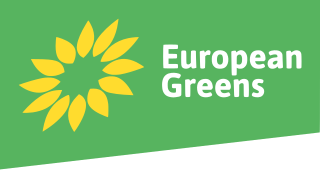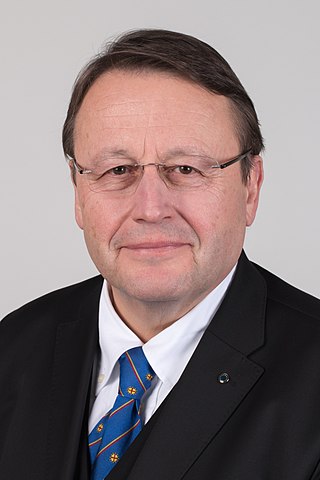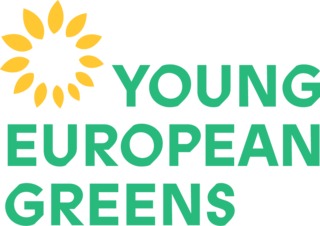
The European Parliament (EP) is one of the two legislative bodies of the European Union and one of its seven institutions. Together with the Council of the European Union, it adopts European legislation, following a proposal by the European Commission. The Parliament is composed of 720 members (MEPs), after the June 2024 European elections, from a previous 705 MEPs. It represents the second-largest democratic electorate in the world, with an electorate of around 375 million eligible voters in 2024.

The Alliance of Liberals and Democrats for Europe Party is a European political party composed of 76 national-level parties from across Europe, mainly active in the European Union. The ALDE Party is affiliated with Liberal International and a recognised European political party, incorporated as a non-profit association under Belgian law.
The World Wide Web Consortium (W3C) is the main international standards organization for the World Wide Web. Founded in 1994 and led by Tim Berners-Lee, the consortium is made up of member organizations that maintain full-time staff working together in the development of standards for the World Wide Web. As of 5 March 2023, W3C had 462 members. W3C also engages in education and outreach, develops software and serves as an open forum for discussion about the Web.

A member of the European Parliament (MEP) is a person who has been elected to serve as a popular representative in the European Parliament.

The European Green Party (EGP), also referred to as European Greens, is a transnational, European political party representing national parties from across Europe who share Green values.

James Edmund Moncrieff Elles is a former Conservative Party Member of the European Parliament (MEP) for South East England.

The European People's Party (EPP) is a European political party with Christian democratic, liberal-conservative, and conservative member parties. A transnational organisation, it is composed of other political parties. Founded by primarily Christian-democratic parties in 1976, it has since broadened its membership to include liberal-conservative parties and parties with other centre-right political perspectives. On 31 May 2022, the party elected as its President Manfred Weber, who was also EPP's Spitzenkandidat in 2019.

A European political party, formerly known as a political party at European level and informally as a Europarty, is a type of European political alliance recognised as a political party operating transnationally in Europe and within the institutions of the European Union (EU). They are regulated and funded by EU Regulation 1141/2014 on the statute and funding of European political parties and European political foundations, and their operations are supervised by the Authority for European Political Parties and European Political Foundations (APPF).

Daniel Caspary is a German politician who has been serving as a Member of the European Parliament (MEP) since 2004. He is a member of the Christian Democratic Union (CDU), part of the European People's Party (EPP). Daniel Caspary is now in the fourth legislature of the European Parliament. Daniel Caspary lives in Weingarten. He is married and has five children.

Piia-Noora Kauppi is a Finnish former politician who currently serves as the managing director of the Federation of Finnish Financial Services. She served as a Member of the European Parliament (MEP) of the European People's Party from 1999 to 2008.

Paul Rübig is an Austrian politician who served as a Member of the European Parliament (MEP) from 1996 until 2019. He is a member of the Austrian People's Party, part of the European People's Party.

The Federation of Young European Greens, often referred to as FYEG, is an umbrella organisation that gathers young green movements and organisations across Europe with 40,000 members. FYEG's aim is to defend climate and social justice on the European level. Since 2007, FYEG is the European Green Party's youth wing.

European Digital Rights is an international advocacy group headquartered in Brussels, Belgium. EDRi is a network collective of non-profit organizations (NGO), experts, advocates and academics working to defend and advance digital rights across the continent. As of October 2022, EDRi is made of more than 40 NGOs, as well as experts, advocates and academics from all across Europe.
The European Movement - Belgium (EMB) is the Belgian branch of the International European Movement. As a non-profit association, open to all individuals and organisations supporting European integration, the EMB works for the promotion of a united Europe, closer to its citizens. In this context, it informs and calls on Europe and to contribute to the development of a European consciousness. Supported by its members, the EMB is independent and autonomous, with headquarters in Brussels.

The Éclaireuses et Éclaireurs israélites de France is a Jewish Scouting and Guiding organization in France. It was founded in 1923 and serves about 4,000 members. The EEIF is a member of the Fédération du Scoutisme Français and of the International Forum of Jewish Scouts.
The European Interoperability Framework (EIF) is a set of recommendations which specify how administrations, businesses and citizens communicate with each other within the European Union and across Member State borders.

Pirate Parties International (PPI) is an international non-profit and non-governmental organization with headquarters in Brussels, Belgium. Formed in 2010, it serves as a worldwide organization for Pirate Parties, currently representing 39 members from 36 countries across Europe, the Americas, Asia, Africa and Australasia. The Pirate Parties are political incarnations of the freedom of expression movement, trying to achieve their goals by the means of the established political system rather than just through activism. In 2017, PPI had been granted special consultative status to the United Nations Economic and Social Council.
Pirate Party is a label adopted by various political parties worldwide that share a set of values and policies focused on civil rights in the digital age. The fundamental principles of Pirate Parties include freedom of information, freedom of the press, freedom of expression, digital rights and internet freedom. The first Pirate Party was founded in Sweden in 2006 by Rick Falkvinge initially named "Piratpartiet", and the movement has since expanded to over 60 countries.
The Platform of European Memory and Conscience is an educational project of the European Union bringing together government institutions and NGOs from EU countries active in research, documentation, awareness raising and education about the crimes of totalitarian regimes. Its membership includes 68 government agencies and NGOs from 15 EU member states and 8 non-EU countries including Ukraine, Albania, Georgia, Iceland, Moldova, the United Kingdom, the United States and Canada. Its members include the Institute of National Remembrance, the Berlin-Hohenschönhausen Memorial, the Stasi Records Agency and the Victims of Communism Memorial Foundation. The platform has offices in Prague and Brussels (formerly). The President of the platform was Göran Lindblad (politician) (2012-2017), later Łukasz Kamiński, former President of the Polish Institute of National Remembrance (2017-2022). In the current term of office Marek Mutor serves the President of Platform.

The Progressive Alliance of Socialists and Democrats (S&D) is the political group in the European Parliament of the Party of European Socialists (PES). The Progressive Alliance of Socialists and Democrats was officially founded as a Socialist Group on 29 June 1953, which makes it the second oldest political group in the European Parliament after the European People's Party Group. It adopted its present-day name on 23 June 2009. Centre-left in orientation, the group mostly comprises social democratic parties and is affiliated with the Progressive Alliance and Socialist International.